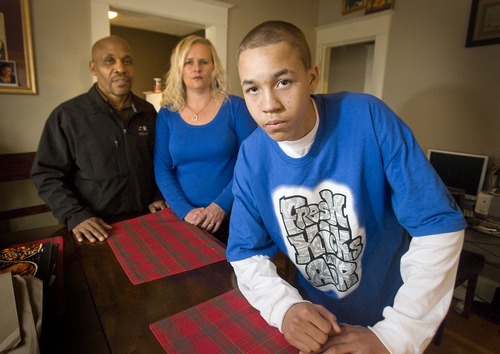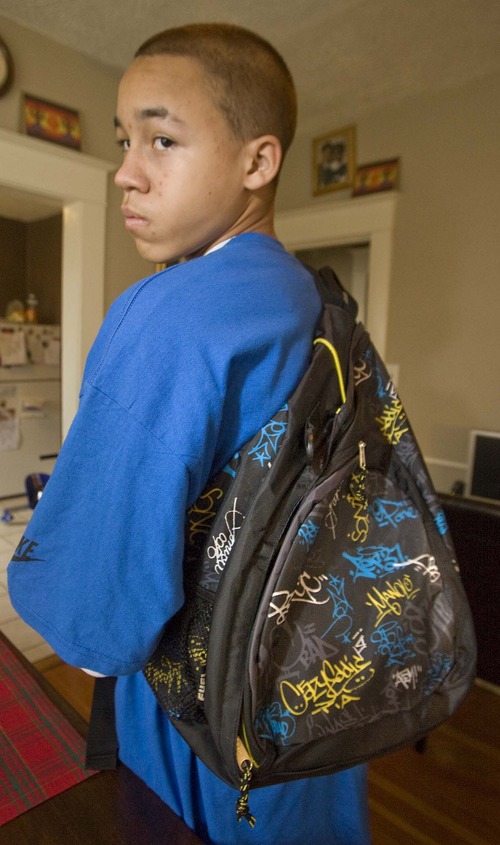This is an archived article that was published on sltrib.com in 2012, and information in the article may be outdated. It is provided only for personal research purposes and may not be reprinted.
The American Civil Liberties Union filed a proposed class-action lawsuit Thursday over a "gang sweep" two years ago at West High School in Salt Lake City, during which between 14 and 40 students of color were detained, questioned and falsely accused of being gang members.
Defendants in the complaint filed in U.S. District Court are the police departments for Salt Lake City, West Jordan and West Valley cities; the Unified Police Department's Metro Gang Unit, Salt Lake County and Salt Lake City School District officials.
The lawsuit alleges the action violated state and federal constitutional rights. It was filed by the local and national offices of the ACLU, who are representing the father of one boy detained in the sweep.
Jason Olsen, spokesman for the Salt Lake City School District, said the district doesn't comment on lawsuits or litigation. Detective Mike Hamideh, spokesman for the Salt Lake City Police Department, also declined comment.
According to the complaint, a gang task force of 16 officers interrogated students at West High School in December 2010 and put information about them in a gang database that potentially could subject them to additional police scrutiny. The complaint says police denied students' requests to call their parents or leave the room. It also alleges the district's anti-gang policy is unconstitutionally vague.
Kaleb Winston, then 14 and a freshman at West High, was among the students questioned. Two plain-clothed officers approached him in the cafeteria and asked to speak to him; the teenager thought they were teachers. The officers took Winston to a nearby room and accused him of graffiti vandalism, which the teen denied.
As the questioning continued, Winston got upset and tried to leave but an officer told him to "quit acting tough" and grabbed his arm, leaving a small red bruise. He was then taken to a detention room, where officers searched his graffiti-patterned backpack and questioned him about drawings on a sketch pad he used in an art class, claiming the images resembled gang insignia.
Winston, who is bi-racial, denied any gang affiliation, but the officers accused him of tagging sites around the school. They made the boy hold a plate like those used when offenders are booked into jail that read, "My name is Kaleb Winston and I am a gang tagger." Officers then told the teen they would keep a file on him.
The boy's parents said he was in tears when he arrived home after school and felt bullied by police.
A police spokesman said at the time that the school had asked the city's gang unit for help because of an increase of graffiti and "gang attire" at the campus, and the officers' goal was to make contact with students and steer them in the right direction.
When Kevin Winston and his wife Lisa objected to how their son was treated, they were told his blue clothing and style of dressing — baggy basketball shirts and basketball shoes — signaled he was the "type" to be a gang member. The complaint says officers told Kaleb's mother that the purpose of the raid was address a "problem with the Mexicans" at West High and that she had "her head up her ass" if she did not know her son was a gang tagger. They suggested he changed clothes when not home to fool them.
At the time, Kaleb worked in the school cafeteria, was a referee for the county's recreational Junior Jazz basketball program and had won an academic award for improving his grades. He has no juvenile record.
But the experience affected him. His grades have fallen and he had given up drawing. Kaleb temporarily transferred out of West High, but has since returned and is now a junior at the school. He fears police and struggles with his racial identity now, the complaint states.
"I am bringing this case because I want to help make sure that what happened to me doesn't happen to any other student," Kaleb Winston said in a press release.
All of the students questioned in 2010 were of Latino, African-American or Pacific Island descent, the complaint states.
"Schools should be a place where everyone can learn and grow, not a location where students of color are targeted and harassed," said Courtney Bowie, senior staff attorney with the ACLU Racial Justice Program, in a statement announcing the lawsuit.
Pattern of profiling?
The ACLU said the Utah case is part of a national pattern of criminalizing students of color, exemplified in a report it presented to a U.S. Senate subcommittee this week that shows more than 70 percent of students referred to law enforcement by schools are African-American or Latino.
That pattern also is reflected in data presented Thursday in Utah to the state's Commission on Criminal and Juvenile Justice. That data show that statewide, minority youth are arrested at a rate that is 68 percent higher than that for white youth.
The arrest rate for African-American youth is more than three times higher than for white youth, and has risen steadily since fiscal year 2008. The statewide rate for Latino youth has declined slightly since 2008, but Latino teens are arrested at a rate that is 84 percent higher than that for white youth.
Minority youth also are referred to diversion programs at a lower rate statewide than white youth, which means they appear in juvenile court more often.
Brooke Adams





